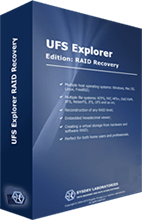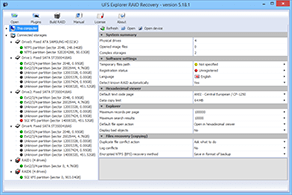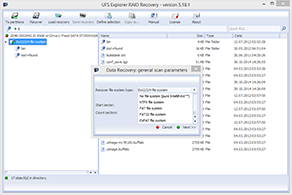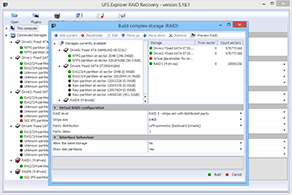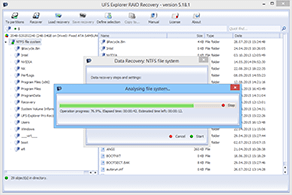
UFS Explorer RAID Recovery is particularly intended for reconstruction of RAID storages. The software covers standard and nested RAID configurations and allows assembling RAID storages from a set of virtual disks or disk images. After assembly, the RAID storage becomes available for data recovery tools in the program. Although primarily designed for complex devices, the RAID Recovery handles other storages with equal efficiency.
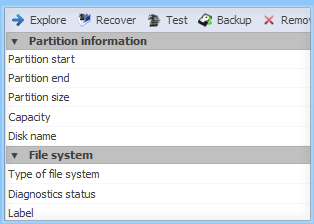
Key features
The software contains RAID Builder, an instrument for assembling storages based on RAID technology. The instrument allows reconstructing standard Levels 0, 3, 5, 6 and JBOD as well as nested Levels 50 and 60.
The software works with virtual environment as efficiently as with hardware. Therefore, assembly of RAID storages from a set of virtual disks and disk image files is also possible with this tool.
The embedded RAID Builder is an ideal tool for NAS recovery. The software recognizes RAID metadata on NAS drives and suggests reconstructing RAID configuration automatically. Supported NAS models include the most popular devices such as Buffalo Technology (TeraStation, LinkStation), Iomega, Synology, Intel, etc.
UFS Explorer RAID Recovery allows viewing contents of disks, disk partitions and files in hexadecimal mode. The in-built hexadecimal viewer may be helpful in defining RAID parameters such as drives order, parity distribution algorithm as well as in examination of the overall disk consistency.
The utility is able to recover backups created with the Apple software Time Machine, a default backup application included with macOS. UFS Explorer RAID Recovery provides recovery of backups lost due to deletion of old backups, issues with the macOS version or the external disk error. With support of file links the software provides complete recovery results.
Beside RAID, the software deals with all types of other data storages, such as hard drives and USB storages, virtual disks and disk images. You can apply this full-featured program to any other device if it happens to undergo the data loss problem.
NTFS, FAT/FAT32, exFAT;
XFS, Linux JFS, Ext2-Ext4, ReiserFS;
Apple HFS+;
UFS/UFS2, big-endian UFS;
NTFS:
full support: data access, search for lost partitions, RAID recovery, recovery of deleted files, recovery after formatting and file system damage.FAT/FAT32/exFAT:
full support: data access, search for lost partitions, recovery of deleted files, recovery after formatting and file system damage.XFS:
full support: data access, search for lost partitions, RAID recovery, recovery of deleted files, recovery after formatting and file system damage. Support of NAS devices and custom servers.Apple HFS+:
full support: data access, search for lost partitions, RAID recovery, recovery of deleted files*, recovery after file system damage.Linux JFS:
full support: data access, search for lost partitions, RAID recovery, recovery of deleted files, recovery after formatting and file system damage.Ext2-Ext4:
full support: data access, search for lost partitions, RAID recovery, recovery of deleted files*, recovery after file system damage. Support of both NAS and custom servers.ReiserFS:
full support: data access, search for lost partitions, RAID recovery, recovery of deleted files, recovery after formatting and file system damage.UFS/UFS2:
data access, search for lost partitions, RAID recovery for both little-endian and big-endian variations. Recovery after file system damage. Very limited recovery of deleted files.
Automatic reconstruction of mdadm, LVM, Apple Software RAID, Intel Matrix;
Supported are most popular standard RAID patterns for RAID0, RAID1E, RAID3, RAID5, RAID6, RAID7, etc.;
RAID-on-RAID support: RAID level 10, 50, 60, 50E, etc.;
Supported are custom RAID patterns via RDL or Runtime VIM.
The software will copy files with the size below 768 KB only;
"Save" function of certain hexadecimal viewer/editor dialogs is disabled.
Microsoft Windows ®: starting with Windows ® XP with Service Pack 3 and later;
macOS: all versions starting with 10.7 and above;
Linux: Debian Linux 6.0 (or compatible) and above.
Intel Architecture, 32-bit (IA-32, x86);
AMD64 (x86-64).
any of supported operating systems;
at least 20 MB of free space on the disk for software executable files;
at least 1 GB of RAM;
Linux software version can run from most modern Linux Live CD.
64-bit edition of any of supported operating systems;
over 1 GB of free space on the disk for the program and temporary files;
at least 2 GB of RAM and 4 logical cores CPU;
default web browser.
